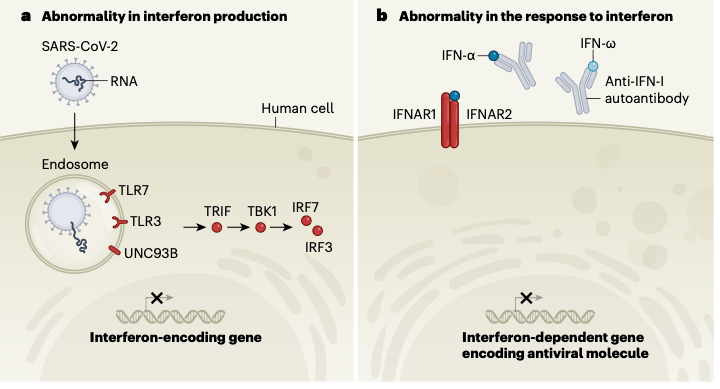One of the most fascinating and heart wrenching outcomes of this pandemic is the almost random way that some individuals become horribly ill from COVID-19. In younger people, it was clear early on that some had genetic errors in their immune systems that made them susceptible to more severe infection with COVID-19. These genetic errors involved immune components that specifically respond to viruses and included defects in the production of immune cytokines (hormones). In particular, the defects were associated with the interferons that provide immediate defenses against viral infection.
I referenced these genetic immune problems in this blog almost two years ago, and it has now been documented that almost any issue with the production of interferon in response to COVID will lead to severe infections and potentially death in younger people. This includes defects in either recognizing viral infection, signaling cells to produce interferon, or problems in the genes that encode for interferon.
What these genetic abnormalities did not explain is the phenomenon of increasing risk of death from COVID-19 in the elderly. Older age is the factor most closely associated with increased likelihood of death from COVID-19, especially for individuals beyond the age of 70. Age also appears to be independent of other risk factors like obesity or hypertension. Since elderly individuals’ genetics do not change over their life it wasn’t thought that problems with interferon immunity might exist in these individuals. However, it now turns out that many elderly individuals do have defects in interferon immunity for another reason.
For many years immunologists, particularly Dr. Steve Holland at NIH, have identified unusual patients with autoantibodies that neutralized interferon. These individuals live totally normal lives for the most part and only rarely have some unusual infection. Most of the time these were infections with variants of mycobacteria, organisms related to those that cause tuberculosis. With appropriate treatment and supplemental interferon, these people usually could recover from their infections and did well.
After the risk of severe COVID-19 from genetic problems with interferon was identified, investigators began looking for autoantibodies to interferon in severe COVID-19 patients. It now turns out that a defining factor associated with severe COVID-19 and ICU hospitalization is neutralizing autoantibodies to interferon. It is essentially a new and very common autoimmune disease.

Importantly, scientists looked at different age groups, and it turned out that the likelihood of an individual having interferon autoantibodies increases exponentially with age. They are most common in those over the age of 80 and are present in about 6% of this group. However, these autoantibodies are seen in up to 20% of those over 80 who have severe COVID-19 and 20% of COVID-19 deaths regardless of age.
The practical meaning of this finding is that anyone who is infected with COVID-19 and appears ill should be screened for interferon neutralizing autoantibodies. These patients should be treated more aggressively and potentially given interferon early in the course of their illness. Screening is particularly important for elderly individuals and for individuals with other autoimmune diseases since having a single autoimmune disease is a risk factor for interferon autoantibodies.

Changes to the natural environment like the COVID-19 pandemic often lead to insights into human health. It is helpful from this that we now recognize this new autoimmune problem. It may be that other viral diseases that are most deadly in the elderly, such as influenza, may also be related to this phenomenon. In addition, autoantibodies to other parts of the immune system have now been identified and may play a role in other patients with severe COVID-19. Clearly, screening for interferon antibodies may become one important way to prevent death from many viral infections in the elderly.

A note: the autoantibody studies were spearheaded by a young physician scientist, Dr Paul Bastard, who was recently given a prestigious award for this work. It is well deserved!
Dr baker is there anyway you can test for these autoantibodies? I have sjogrens and wonder if I would get seriously ILL if I get covid? I’m fully vaccinated and wonder if I should keep on masking.
LikeLiked by 1 person
There are commercial assays for this. Please contact your MD.
Best,
JB
LikeLiked by 1 person
Can’t make much of this. Should I be scared?
LikeLike
Only if over 65 or otherwise have an autoimmune disease.
LikeLike
Thanks for insightful commentary on interferon as another treatment option. As with the Pfizer Covid pill, I assume this also requires early testing, identification, and prescription. Could you offer a commentary on your view of how treatment options should become a regular part of managing Covid variants going forward, how they may complement vaccinations, and what additional research on testing, treatment, and vaccination might prove helpful?
LikeLiked by 1 person
The one advantage since this is a genetic or autoimmune factor one can screen for it long before a breakthrough infection and be prepared. Best, JB
LikeLike
Very helpful information. How well do the vaccines protect people with these autoimmune antibodies?
LikeLike
Well. Key is preventing the infection from taking control.
LikeLike